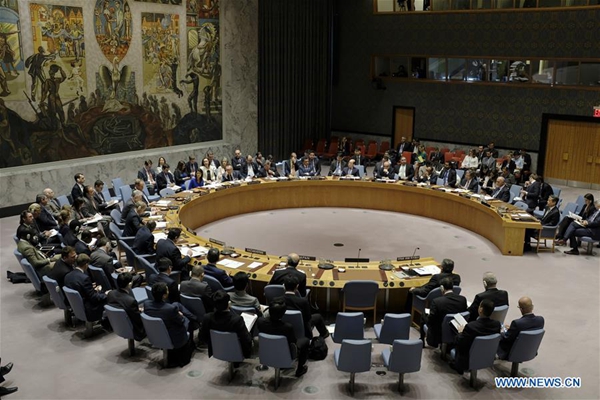Chemical weapons attack in Syria
- By Sajjad Malik
 0 Comment(s)
0 Comment(s) Print
Print E-mail China.org.cn, April 7, 2017
E-mail China.org.cn, April 7, 2017
|
|
|
Photo taken on April 5, 2017, shows the United Nations Security Council holding an emergency meeting on alleged chemical weapon attack in Syria, at the UN headquarters in New York. China supports the Organization for the Prohibition of Chemical Weapons (OPCW) and related UN entities in carrying out comprehensive, objective and fair investigations into uses of chemicals as weapons in Syria, said China's permanent representative to the UN Liu Jieyi here on Wednesday. [Xinhua/Li Muzi] |
Truth is the first casualty in every conflict, and this was illustrated again in the incident involving use of deadly chemical weapons in Syria's Khan Sheikhoun area, in which an airstrike by the Syrian Air Force killed 72 people, including many children.
The killings and sufferings are undeniable. So are the traces of Sarin, a deadly nerve gas, which choked many to death. This use of prohibited chemical weapons has been condemned around the world. However, the problem lies in differences over who is responsible for their use. Hence, the death of truth.
The United States and several Western or other anti-Assad governments have squarely blamed the regime's air force. However, Syria, and its chief backer Russia, accused rebels who allegedly had a depot of those weapons targeted by the jets leading to the poisoning.
It is also a technical issue. So far, it is not clear if a facility producing and storing chemical weapons is capable of causing widespread damage to the people in the case of aerial attack. Some experts say it is possible, others disagree. Their idea is that extensive loss of life shows the weapons dropped by the jets contained the deadly chemicals.
The incident highlights the complexity of the intractable war now in its sixth year. With hundreds and thousands of people killed, maimed or evicted from homes, the enormity of the tragedy has already gone beyond all limits.
Ideally, the latest attack should be an eye-opener for different parties, directly or indirectly involved in the conflict. Unfortunately, it is once again being used to score points and promote rival political agendas than finding solutions.
President Donald Trump said after the attack that his "attitude" towards Bashar al-Assad was changing. Almost the same thing was repeated by the U.S. ambassador to the U.N., Nikki Haley, who said that her country would be compelled to take action on its own in case Russia and others fail to cooperate. Vice President Mike Pence said all options were on the table. The drum-beating has just started.
The latest incident reminds us of the terrible chemical attacks of August 2013 in the Ghouta area near Damascus in which hundreds of civilians were killed. Widespread global outcry followed. Assad was blamed and, for a while, it seemed the U.S. might resort to force to punish the Syrian leader.
Russia intervened and a deal was struck to rid Syria of chemical weapons. Despite this, use of chemical weapons continued to be reported.
The latest attack could be used to turn heat on Assad to step down or face consequences for allegedly "gassing his people." Since Russia has already shown its cards, that it would stand by the Syrian government, chances for a politically negotiated settlement seem to have receded.
Establishing who was responsible is obviously of first importance. Since the area targeted by the jets is at the heart of a war zone, sending neutral experts to seek forensic evidence is highly challenging. The Security Council can be helpful. Instead of wasting time in useless rhetoric, it should work out the modalities to fix the responsibility.
The U.N., or any other neutral body, should be allowed to send a team of experts to determine if the Syrian jets used the chemical weapons or whether ground storage facilities turned into inferno due to being hit from the air. Once the perpetrators are known, the next step could be taken to permanently address the issue of chemical weapons in Syria.
For many experts, it would be extremely foolish of the Syrian government to use such weapons when it is already winning and also can use conventional weapons with impunity to kill scores of people, including militants and those civilians trapped in the places controlled by rebels.
Others suggest that Assad has become so powerful and bold that he might go to any limits to bring the conflict to the end at the earliest moment - regardless of cost.
Sajjad Malik is a columnist with China.org.cn. For more information please visit:
http://www.china.org.cn/opinion/SajjadMalik.htm
Opinion articles reflect the views of their authors, not necessarily those of China.org.cn.







Go to Forum >>0 Comment(s)